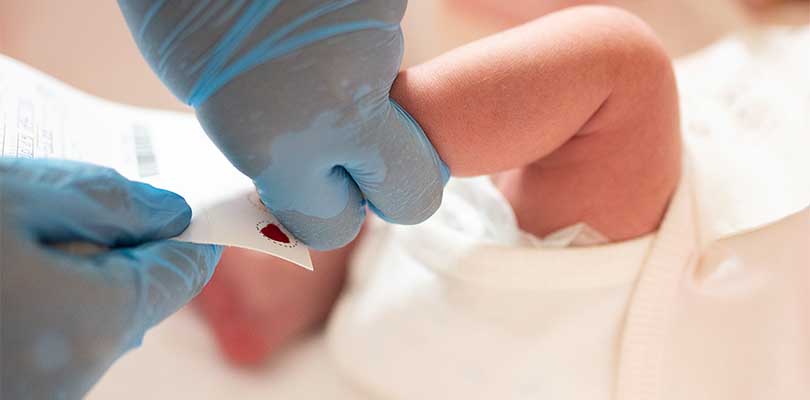Pros and Cons of Newborn screening
You’ve just brought a baby into the world and keeping them happy and healthy is your number one concern. One service hospitals offer for parental peace of mind is newborn screening. In addition to infant hearing tests, healthcare professionals offer newborn screening for your little one.
What is Newborn Screening?
Newborn screening has been offered as a public health service in Canada for over 50 years. It’s a simple blood test that doctors use to check for rare genetic, hormone-related and metabolic conditions that are not readily apparent at birth but can cause serious health problems down the road. Hospitals check every newborn for certain health disorders with the purpose of identifying treatable conditions.
The most common disorders identified in newborn screening include:
- Congenital hypothyroidism.
- Cystic fibrosis.
- Medium-chain acylcoenzyme A dehydrogenase (MCAD deficiency).
- Phenylketonuria.
What is Newborn Screening Used For?
Discovering conditions that may be present from birth enable healthcare professionals to prevent and/or minimize the potential for serious and permanent health complications as a child gets older.
Newborn screening tests can detect:
- Metabolic problems. The metabolism coverts food into energy that is used by all parts of the body. Many metabolic problems happen when certain enzymes are missing or malfunctioning. Metabolic disorders that may be screened for include phenylketonuria, methylmalonic acidemia, maple syrup urine disease, tyrosinemia and more.
- Hormone problems. Our glands make hormones, which are chemical messengers for the body. Health issues arise when glands make and secrete too much or not enough hormones. Some hormone issues that may be found in newborn screening are congenital hypothyroidism and congenital adrenal hyperplasia.
- Hemoglobin problems. Hemoglobin is a protein found in red blood cells. It carries oxygen throughout the body. Low hemoglobin can lead to health issues, like anemia. Some hemoglobin issues that may be discovered with newborn screening are sickle cell disease and beta thalassemia.
- Other rare medical problems. This can include biotinidase deficiency, cystic fibrosis, severe combined immunodeficiency, spinal muscle atrophy and more.
Pros and Cons of Newborn Screening
There are many positive reasons for newborn screening. When babies get this blood test done:
- It discovers babies who may have a rare disorder, even if they appear healthy.
- Doctors can refer the baby to a specialist, diagnose the condition early and start treatment as soon as possible before irreversible damage occurs.
- Earlier treatment can prevent or lower a child’s chance for a serious health problem in the future.
- It gives parents a sense of relief having more information and greater understanding about their child’s health status to make more informed medical and lifestyle decisions.
Cloth diapers vs disposable is one decision to make on top of many for new parents. Let us help you. Here is what to know about both options.
There are a few drawbacks to newborn screening. Some things to consider are:
- There may be limitations to the screening.
- Babies often cry during the blood test and it can be hard for parents to watch (although taking the sample does not harm the baby).
- The results may increase your stress and anxiety.
- This screening does not actually make a diagnosis. It flags conditions that a child may be at risk of having.
- It’s possible that babies may screen positive for a condition, but further diagnostic testing may reveal that baby does not have that condition (a false positive).
- False negative tests are rare, but they are possible. In this instance, a baby is not identified to have one of the conditions they are screened for, but they may be diagnosed with that condition in the future.
The Newborn Screening Process
Newborn metabolic screening is quite straightforward and simple, occurring when the infant is one to two days old. After a baby is born, either in the hospital or at home, a healthcare professional takes a small blood sample (usually in a hospital setting). They prick the baby’s heel and squeeze out a few drops of blood, transferring it to a special card. This card is sent to a provincial laboratory for testing and results.
After testing, these blood samples are stored in a secure facility as part of a child’s medical record. In some instances, they may be used to improve and develop provincial and territorial screening processes.
Typically, these blood test results are ready in less than a week. These results are treated as “no news is good news” and parents often will not hear any results if the blood tests come back normal. Instead, parents are contacted if their baby tests positive for a condition. If this is the case, doctors will order more tests to confirm or rule out a diagnosis.
If a baby receives a confirmed diagnosis, their physician may refer them to a specialist for treatment. Treatment should commence as early as possible as an untreated diagnosis may lead to more complex issues such as a severe mental handicap, growth issues, sudden infant death, or other problems.
When is Newborn Screening Necessary?
Newborn screening is considered to be the standard of care. Most families want their child to be screened but this testing is not mandatory. If you decide to decline the testing, an opt-out document needs to be signed and put into the baby’s medical record.
You want the best for your children. The additional information parents receive from newborn screening can offer more details about their child’s health. If a baby does get diagnosed with a medical issue from this screening, it gives parents and medical professionals a head start on treatment for a better prognosis.







